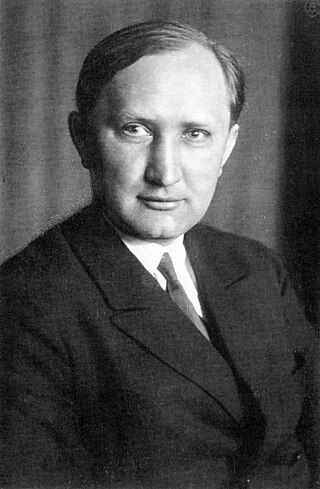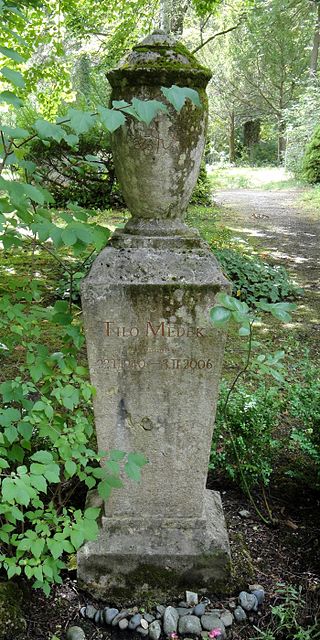Related Research Articles

Ernst Klee was a German journalist and author. As a writer on Germany's history, he was best known for his exposure and documentation of medical crimes in Nazi Germany, much of which was concerned with the Action T4 or involuntary euthanasia program. He is the author of "The Good Old Days": The Holocaust Through the Eyes of the Perpetrators and Bystanders first published in the English translation in 1991.
Johannes Wolfgang Zender was a German conductor and composer. He was the chief conductor of several opera houses, and his compositions, many of them vocal music, have been performed at international festivals.

Das Floß der Medusa is a 1967 secular oratorio by the German composer Hans Werner Henze. It is regarded as a seminal work in the composer's alignment with left-wing politics.

Emil Bock was a German anthroposophist, author, theologian and one of the founders of The Christian Community.
Rudolf Ernst Paul Schündler was a German actor and director. He played "Karl" in The Exorcist (1973).

Luise Rinser was a German writer, best known for her novels and short stories.

Ernest Wichner is a German writer, editor, and literary translator of Banat Swabian origin.
Rolf Schweizer was a German composer, choirmaster and church music director, who was based primarily at Pforzheim. Schweizer was part of the movement Neues Geistliches Lied, and his compositions, several of which appear in the Protestant hymnal Evangelisches Gesangbuch (EG), were heavily influenced by contemporary secular music, especially jazz.

Lothar Zenetti was a German Catholic theologian, priest, and author of books and poetry. In Frankfurt, he was both a minister for young people and a parish priest. He was also active on radio and television. His songs, for example the popular "Das Weizenkorn muss sterben" and "Segne dieses Kind", appear in both Protestant and Catholic hymnals.
Peter Janssens was a German musician and composer who wrote and performed incidental music for several theatres, and songs and musicals of the genre Neues Geistliches Lied, a pioneer of Sacropop. He worked at a German theatre in Buenos Aires, set several works by Ernesto Cardenal to music and composed in 1992 a passion music, in memory of 500 years after the European invasion in Latin America.

Tilo Medek, originally Müller-Medek, was a German classical composer, musicologist and music publisher. He grew up in East Germany, but was inspired by the Darmstädter Ferienkurse. He composed radio plays and incidental music. His setting of Lenin's Decree on Peace led to restrictions, and after he showed solidarity with the expatriated Wolf Biermann, he also had to move to the West, where he composed an opera Katharina Blum based on Heinrich Böll's novel, and worked in education. He received international awards from 1967 onwards.

The Reinhard Mohn Prize has been awarded by the Bertelsmann Stiftung since 2011. It recognizes internationally renowned individuals for their forward-looking solutions to social and political challenges. Given in memory of Reinhard Mohn, who died in 2009, it succeeds the Carl Bertelsmann Prize, which was awarded from 1988 to 2008. The Reinhard Mohn Prize is one of the main responsibilities of Liz Mohn, honorary member of the Bertelsmann Stiftung's board of trustees.
Gösta Neuwirth is an Austrian musicologist, composer and academic teacher. He studied in Vienna and Berlin, where he wrote a dissertation on harmony in Franz Schreker's Der ferne Klang. He has taught at universities and music schools including the Musikhochschule Graz, University of Graz, Hochschule der Künste Berlin and University of Freiburg. His compositions include a string quartet and a chamber opera.
Hans Joachim Marx is a German music historian. He has been professor of European music history at the University of Hamburg.
Günther Massenkeil was a German musicologist, academic teacher, writer and concert singer (baritone). His main field of research was sacred music of the 16th to 20th century. He served as director of the musicology department at the University of Bonn from 1966 to 1991. He became known beyond academia for his editing and supplementing of the eight-volume encyclopaedia, Das Große Lexikon der Musik.
Hans Schmidt was a German musicologist.

Günter Katzenberger was a German musician, musicologist, conductor, and university faculty, professor for Historical musicology at the Hochschule für Musik, Theater und Medien Hannover as well as a non fiction writer and publisher.

Harry Goldschmidt was a Swiss musicologist.
Wilfried Hiller is a German composer. He became known above all for his stage works for families, children and young people.